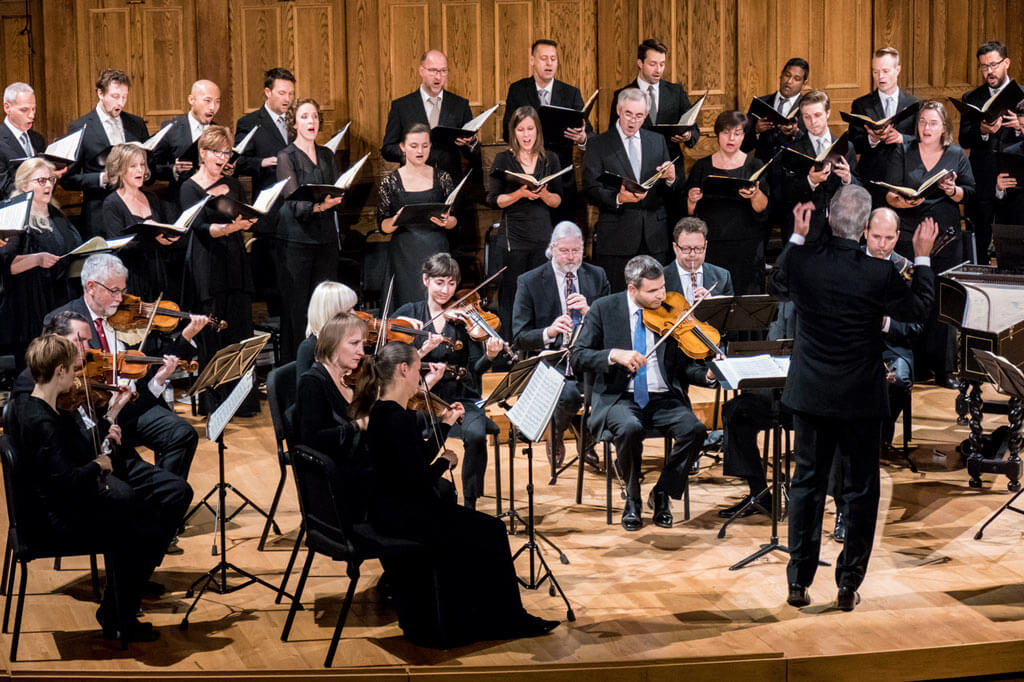
Tafelmusik Chamber Choir and Orchestra. Ivars Taurins, conductor. Jeanne Lamon Hall, Trinity-St Paul’s Centre. To November 6.
At the first performance of its 35th-anniversary program on Wednesday night, the Tafelmusik Chamber Choir sang lyrics in French that perfectly encapsulated its way of seducing us year after year: “The more pleasure requires care; the more it enchants.”
The choir’s carefully crafted sound, delivered with vivid expression is nothing less than a Canadian national treasure. It is a gift to the Baroque composers that wrote the core of its repertoire. Just about every time they get out to sing, they make the scores come alive in a way that is the essence of what makes people fall deeply in love with music.
I first fell under the spell of the choral magic that founding conductor Ivars Taurins weaves in one of the first concerts I attended in Toronto. I sat rapt, near tears, as the ensemble expertly teased out excerpts from Henry Purcell’s King Arthur. I was hooked, fresh out of university, long before I even dreamt that one day I might review them as a critic.
In a world that craves new things done in new ways, one might wonder how a group dedicated to music written two to three centuries ago can flourish. But Taurins and by extension, the Tafelmusik Chamber Choir, have grown, experimented and done everything to make what they interpret sound as fresh as the day the last of the copyist’s quill-applied ink dried on the pages of the score.
Programming is important, too. And Taurins has never been shy about introducing us to works we might not otherwise hear in Toronto.
This week’s celebratory program is no exception. Taurins could easily have stitched together a best-of from the last three-and-a-half decades. Instead, he paid homage to the choir’s history as both a stage ensemble and opera chorus (in the service of Opera Atelier) in 100 minutes of music sacred and secular.
With the backing of the full Tafelmusik Orchestra, the evening offered an early dramatic work of George Frideric Handel (1865-1759), Laudate pueri, composed in Rome, probably in 1706, before the young German composer moved to England. The soloist is soprano Sherezade Panthaki, who was a treat the whole evening.
In Tafelmusik’s early years, back when musicians were still finding their sea legs in the alternate universe of period performance, it was smaller voices that dominated. They were characterised by their pure, vibrato-free sound. And, just as the choir itself has grown in its ability to sing out a wider ranger of colours and textures, Panthaki demonstrated how bigger, lusher voices can also dance nimbly around the technical requirements of Baroque runs and musical ornaments.
The comfortable familiarity of Handel, even this less-often-heard piece, was contrasted with a first for Tafelmusik: a choral work by Roman elder Agostino Steffani (1754-1728). The selections we heard from his setting of the Good Friday Stabat Mater text, and sung using Tafelmusik Chamber Choir choristers in the solo sections, were a dramatic treat. The work also gave the orchestra the opportunity to explore its darker side, colour-wise, to powerful effect.
It certainly made me want to hear much more from this composer.
The first half of the evening ended with the sweet closing Chaconne from the opera Amadis, by Jean-Baptiste Lully (1632-1687). It was all one could do not to sway along with the music. The work also gave us the opportunity to appreciate the contributions of the program’s other two guest soloists: tenor Philippe Gagné and bass-baritone Jonathan Woody.
The second half featured In convertendo Dominus, by Jean-Philippe Rameau (1683-1764) and the Gloria from Jan Dismas Zelenka’s (1679-1745) unfinished Missa dei Filii. The last work also dismissed the guests so that the choir itself could show its stuff.
Throughout the evening, the mastery of detail, the precision, the balance, and the clarity with which it was communicated to the audience were remarkable. This is not the polished sound of a traditional English-style choir; it is something more, something more dynamic and forceful, yet also capable of speaking to us softly.
This remarkable sound also is not something that can be achieved overnight, but over years of careful practice and study. It is also made by professional singers — just 22 of them. Toronto is lucky to have these singers and their leader. We can only hope that the years to come will be just as golden. The program runs to Sunday afternoon. Catch it if you can.
#LUDWIGVAN
Want more updates on Toronto-centric classical music news and review before anyone else finds out? Follow us on Facebook or Twitter for all the latest.
- Classical Music 101: What Does A Conductor Do? - June 17, 2019
- Classical Music 101 | What Does Period Instrument Mean? - May 6, 2019
- CLASSICAL MUSIC 101 | What Does It Mean To Be In Tune? - April 23, 2019



